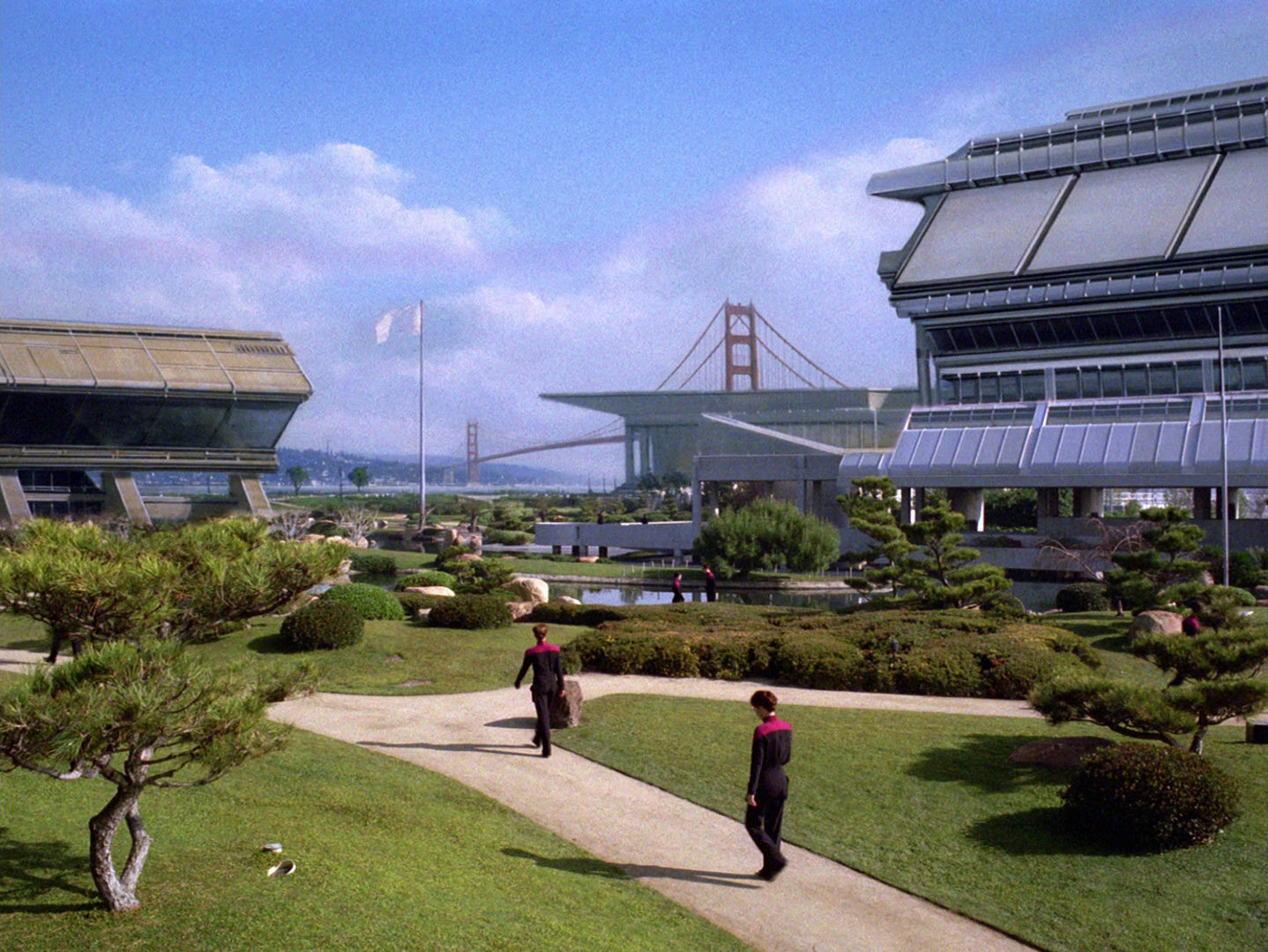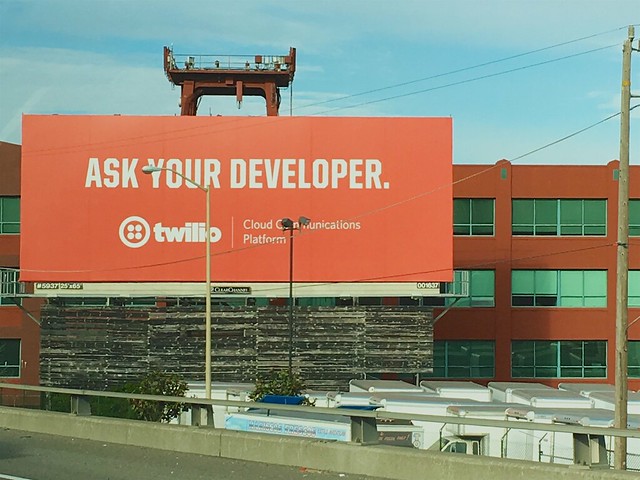One year in San Francisco as a Software Engineer
In 2017 the company I worked for in Toronto got acquired by Yelp. The
software engineers in my company (including myself) were asked to move to San
Francisco. At the end of 2017 we moved, and I spent most of 2018 there.
With the year coming to an end, I thought it might be a good time to reflect
on my time there.
As a software engineer, it’s often suggested that you haven’t really made it to
the top, unless you work in the Bay Area. I disagree with this idea, but it’s
easy to see why some people feel this way.
On my first trip to SF, it was already quite telling. Flying from Toronto
airport I noticed a higher than usual technology themed tees, stickers on
laptops and black terminals. Pretty exciting! By chance My Uber driver to
downtown told me he was applying to a free machine learning course ran by Google.
On the way I noticed that the billboards next to the highways were directly
targetting developers.
SF felt like the Mecca of tech, but also the center of capitalism. There is a
lot of money, but not a lot of wealth. Salaries are the highest I’ve personally
seen, but so is the cost of living.
As a software engineer this more or less evens out (compared to Toronto, where
I’ve lived and worked for a long time), but if you’re not in the business it’s
rough.
Before I moved to SF I never had the intention to move to the Bay. It just
wasn’t a goal for me. But when the opportunity arose, we felt that for the trip
to be worth it, we didn’t really want to lower our qualtity of living standard,
and we wanted a 2-bedroom apartment and a reasonable commute. Ultimately this
meant that our rent was $4250 USD per month, and a larger portion of our salary
going towards rent. Had we stayed longer, we would definitely have tried to
find a cheaper place to live and save more.

You can imagine that at those prices, it’s very difficult for many people to
live in San Francisco. The cost of living has exploded in the last 30 years,
and many people blame the tech industry for this.
Every now and then you’re confronted by this fact that there’s people who
‘hate us’. Take for instance the attacks on the Google commuter bus.
I #love this response to the #antitech graffiti that was trying to spread hate in #SF #MissionDistrict pic.twitter.com/jvSiw7StMV
— Eric Zandona (@EricZ_FamilyMan) June 23, 2016
Personally I can emphasize with the sentiment. Even though I don’t think that
20-something programmers in Google buses are personally responsible for the
disparity, but the brandless tinted Google buses are a powerful symbol for new
class system.
I’ve never seen so much poverty and homelessness before. There’s many major
streets where wearing open shoes would be a big no-no, because of used needles
lying around in plain sight. Seeing people shooting up on Market Street is
pretty normal.
I don’t think this is necessarily a bad thing. I imagine in many cities this
addiction and poverty might be more contained to certain neighbourhoods. It’s
much easier that way to pretend it doesn’t exist if you don’t see it.
One of the silver linings in SF is that there were lots of places to safely do
drugs.
But it’s a weird juxtaposition. There are times where our engineering team would
have lunch in Yerba Buena Gardens, and if you looked one way you would see
electric scooters and onewheels zooming by, and I was actually reminded of
Star Trek episodes that feature Starfleet Academy. I’m not a cynic and it felt
like a futuristic place to be. But, look the other way and you might see someone
defecating on the street. This is absolutely not hyperbole. San Francisco has a
poo problem.

Some people in the tech industry feel pretty awful about this, others are
straight up sociopaths with zero empathy and happily broadcast how they
really feel (that specific person has turned a new page after the fallout from
his comments, but the the article is worth a read to see how different people
think about this).
When I first moved to San Francisco, one of my friends told me on the phone “it
takes about 1-2 months to no longer really see the homeless”. While he didn’t
mean it literally, most people I spoke to adjusted to the homelessness problem
after living in SF for a little while, and developed a sort of cognitive
dissonance. For me the initial shock wore off after some time and it became
fact of life. Occasionally you’re pulled back to reality when something
particularly shocking happens right in front of you. Sharing those events with
friends usually result in conversations where people comment on how absurd
everything is or people share their own recent anecdotes.
In my time there I’ve spent a ton thinking about the ethics of this situation
and what my responsibility is. The truth it, aside from buying a few sandwiches
for people who asked I’ve done almost nothing and feel like a hypocrite for it.
I grew up in a small town in The Netherlands. Population 6000. I grew up thinking
I would be the type of person that would reach out when somebody asks for help,
but I’ve slowly learned that I’m not actually that person. Once I saw a guy lie
on the street next to his wheelchair. He looked confused, possibly high and I
didn’t ask if he needed help. I had somewhere to be. I learned it’s the easiest
to have empathy for people that are the most like me, because I can relate to
them. If you have a mental problem and act ‘strange’ in any way, I just have a
fight-or-flight response and wouldn’t consider making a connection.
There would have been safer ways for me to contribute, but I also didn’t do this.
I didn’t donate or volunteer for anything. The way I sometimes justified this is
that most of my peers don’t either and it doesn’t make me a bad person if I don’t
Other times I just feel like a hypocrite. 99% of my empathy goes to people I know
personally.
It’s 2019 and we left San Francisco. Yelp wasn’t what I hoped it would be. I
sound mostly negative about San Francisco, but the truth is that I really
enjoyed the city. And despite all its flaws, I had a great time there and made
some really good friends and memories. I ended up running into some issues with
my work visa for my next job, which led me back to Toronto. Had it not been for
my visa issues, we probably would have stayed in SF.
It was fun because I could afford it and because I was part of the class that
benefited from the system. I can’t help wondering though that the only reason
Silicon Valley and the Bay Area has been so prosperous is because it’s in a
country where generally people are comfortable with having so much wealth,
while having so many people live under the poverty line.
So if you’re a software engineer and considering moving to the Bay Area,
you’re probably in for a great time.
In my case, I worked for Yelp and it seemed that they were doing well
in terms of benefits, diversity, pay and all the things any modern company
should be. (at least if you’re a developer). But when you go home after work,
also be prepared to see the dystopia that your industry has created as a
by-product.
- Email me and I can publish your response here.
- You can reply to this tweet to automatically see your response here.
- If you’re a dev, you can also send a pull request and edit in your
comment in this article.

